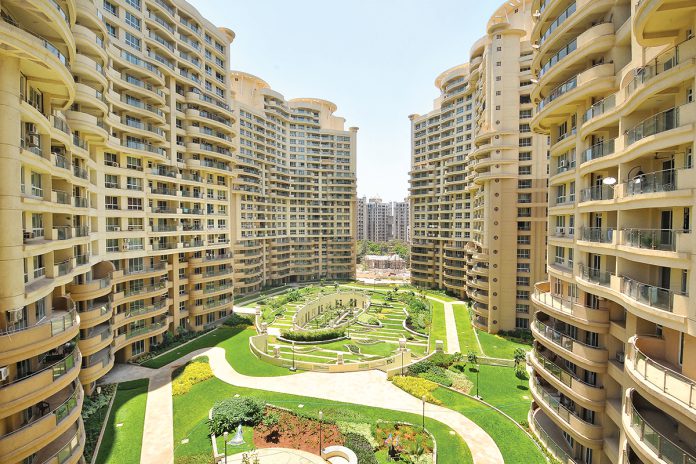From affordable housing to burgeoning investment opportunities, the booming real estate sector is set to propel the nation’s economic growth and quality of life
Words by Manju Yagnik
The future of real estate in India is poised for a monumental transformation as we approach the centenary of our independence. According to a report by Knight Frank, the Indian real estate sector is expected to expand to an astounding $5.8 trillion by 2047. This growth signifies a major shift in the housing segments and underscores the sector’s pivotal role in India’s journey towards becoming a ‘Viksit Bharat’ or a developed nation.
The Future of Real Estate in India
India’s real estate market is on the brink of a significant evolution. By 2047, the sector will witness a diversified growth trajectory encompassing residential, commercial, and industrial real estate. Key factors driving this expansion include rapid urbanisation, increased affordability, technological advancements, and a favourable demographic dividend. The growth in real estate is expected to cater to the burgeoning middle class, which will demand better housing, improved infrastructure, and more comprehensive amenities.

Furthermore, there will be a notable shift in housing segments. Affordable housing, smart homes, and sustainable buildings will dominate the market. Integrating technology and real estate—commonly referred to as PropTech—will revolutionise how properties are bought, sold, and managed. Smart cities, equipped with cutting-edge technology and sustainable practices, will become the norm rather than the exception.
Achieving Viksit Bharat status
Expanding the real estate sector is instrumental in India’s quest to achieve ‘Viksit Bharat’ status by 2047. The real estate industry is a critical driver of economic growth, generating employment, fostering infrastructure development, and contributing to GDP. The sector can significantly reduce unemployment and uplift socio-economic standards by creating millions of jobs across various skill levels.
Real estate development also stimulates ancillary industries such as construction, cement, steel, and logistics. Improved infrastructure, including better housing, transportation, and urban amenities, will enhance the quality of life, thereby attracting global talent and investment. This holistic development is crucial for India to transition into a fully developed nation.
Real Estate as a lucrative market for investors
The real estate market in India presents a compelling investment opportunity. With a projected market size of $5.8 trillion by 2047, investors can expect robust returns driven by sustained demand across residential, commercial, and industrial segments. The growing middle class, increased urbanisation, government initiatives like ‘Housing for All’ and smart city projects further bolster the market’s attractiveness.

Additionally, advancements in real estate technology and sustainable building practices are creating new investment avenues. Investors can diversify their portfolios through green buildings, smart homes, and real estate investment trusts (REITs), which offer more flexibility and liquidity than traditional real estate investments.
Policy recommendations for a healthier market
To ensure the real estate market’s sustained growth and stability, several policy measures need to be implemented.
Regulatory Reforms
Simplifying land acquisition processes, enhancing transparency in property transactions, and enforcing stringent regulations to prevent fraud and malpractice.

Incentivizing Sustainable Development
Providing tax benefits and subsidies for green buildings and sustainable real estate projects to promote environmental stewardship.
Affordable Housing Initiatives
Expanding affordable housing schemes and offering incentives to developers to ensure housing for all segments of society.
Technological Integration
Promoting the adoption of PropTech to streamline property transactions, improve efficiency, and enhance customer experience.

Infrastructure Development
Investing in infrastructure projects to support real estate growth, including transportation, utilities, and digital infrastructure.
Future contribution of Real Estate to the Indian economy
The real estate sector’s contribution to the Indian economy will be substantial by 2047. It is expected to become one of the primary pillars of economic growth, contributing significantly to GDP and employment. As the sector expands, it will drive the development of ancillary industries, stimulate investment, and enhance the overall economic landscape.
Real estate will also play a crucial role in urbanisation and modernization efforts, transforming Indian cities into global hubs of commerce, technology, and innovation. This transformation will attract international businesses and investors, further integrating India into the global economy.
In conclusion…
The future of real estate in Bharat 2047 is bright and promising. With a projected market size of $5.8 trillion, the sector is set to play a crucial role in India’s development journey. Real estate will be pivotal in achieving the ‘Viksit Bharat’ status by fostering economic growth, generating employment, and enhancing infrastructure. The sector offers lucrative opportunities for investors, backed by sustained demand and technological advancements. However, to realise this vision, concerted efforts at the policy level are essential to create a healthy, transparent, and sustainable real estate market.
Manju Yagnik has been associated with Nahar Group for over three decades now, and her invaluable contributions extend beyond the Nahar Group. She serves as Sr. Vice President for NAREDCO-Maharashtra, empowering women leadership and engaging with industry associations like CREDAI, MCHI, FICCI, and RICS. Her remarkable achievements include accolades such as ‘Woman Entrepreneur of the Year,’ ‘Corporate Governance and Business Excellence Award,’ ‘Female Real Estate Professional of the Year,’ and ‘Real Estate Icon of India,’ among many others.


